Itinerary
Day programme:
Arrive at Milan Malpensa Airport. If your cruise/tour package includes a group arrival transfer or if you have purchased a private arrival transfer, you will be greeted by a Uniworld representative and transferred to the Rosa Grand hotel.
Day programme:
Milan is a mecca for Italian fashionistas, famous for its innovative design and stylish flair. Venture inside the city’s hulking Gothic cathedral, as well as its cathedral to capitalism, Europe’s oldest shopping arcade. Alternatively, you can join a Masterpiece Collection optional excursion to Lake Como and Bellagio. This experience is bookable upon arrival, so please inquire with your tour manager about pricing and availability after check-in on Day 1.
Day programme:
En route to Venice, you’ll stop in the literary hometown of Shakespeare’s famously star-crossed teen lovers to see the sights. Later, enjoy lunch at a historic wine estate owned by descendants of Dante and learn about one of the most unique Italian wines, Amarone di Valpolicella.
Venice is a city unlike any other. No matter how often you’ve seen it in photos and films, the real thing is more dreamlike than you could imagine. With canals where streets should be, water shimmers everywhere. The fabulous palaces and churches reflect centuries of history in what was a wealthy trading center between Europe and the Orient. Getting lost in the narrow alleyways is a quintessential part of exploring Venice, but at some point you’ll almost surely end up in Piazza San Marco, where tourists and locals congregate for a coffee or an aperitif.
Day programme:
With your early morning arrival at Doge’s Palace, you’ll be able to marvel at the estate in total peace. Wander through a Venetian neighborhood and experience daily life in an authentic Venetian residential quarter. Later in the evening, cap the day off with a private once-in-a-lifetime experience at an after-hours lighting ceremony inside St. Mark’s Basilica without the crowds.
Venice is a city unlike any other. No matter how often you’ve seen it in photos and films, the real thing is more dreamlike than you could imagine. With canals where streets should be, water shimmers everywhere. The fabulous palaces and churches reflect centuries of history in what was a wealthy trading center between Europe and the Orient. Getting lost in the narrow alleyways is a quintessential part of exploring Venice, but at some point you’ll almost surely end up in Piazza San Marco, where tourists and locals congregate for a coffee or an aperitif.
Day programme:
Start your morning in one of two of the Veneto region’s UNESCO World Heritage cities, Vicenza or Padua. In the afternoon, you’ll reboard the ship for scenic sailing across the lagoon as we head towards Mazzorbo and Burano.
Day programme:
Spend the day exploring the northern lagoon of Venice and its captivating islands. Start with a visit to Torcello’s famous basilica with an art historian, then stroll through the agricultural island of Mazzorbo and the rainbow-hued island of Burano during your free time after lunch. Alternatively, you can take the afternoon to see the renowned glassblowing artisans of Murano at work.
Day programme:
Today, you’ll admire the greatest sites of charming and coastal Chioggia, including a stop at the local and lively market.
Venice is a city unlike any other. No matter how often you’ve seen it in photos and films, the real thing is more dreamlike than you could imagine. With canals where streets should be, water shimmers everywhere. The fabulous palaces and churches reflect centuries of history in what was a wealthy trading center between Europe and the Orient. Getting lost in the narrow alleyways is a quintessential part of exploring Venice, but at some point you’ll almost surely end up in Piazza San Marco, where tourists and locals congregate for a coffee or an aperitif.
Day programme:
This morning, join a sailing excursion where you’ll explore the Po Delta where the Po River and the Adriatic Sea meet. Later, during lunch, we sail back to Venice.
Venice is a city unlike any other. No matter how often you’ve seen it in photos and films, the real thing is more dreamlike than you could imagine. With canals where streets should be, water shimmers everywhere. The fabulous palaces and churches reflect centuries of history in what was a wealthy trading center between Europe and the Orient. Getting lost in the narrow alleyways is a quintessential part of exploring Venice, but at some point you’ll almost surely end up in Piazza San Marco, where tourists and locals congregate for a coffee or an aperitif.
Day programme:
As your water taxi glides past narrow side canals and the Canal Grande, you’ll arrive in style at the Rialto Bridge. The iconic stone arch bridge sits at the narrowest point of the Canal Grande and holds numerous shops and restaurants.
Venice is a city unlike any other. No matter how often you’ve seen it in photos and films, the real thing is more dreamlike than you could imagine. With canals where streets should be, water shimmers everywhere. The fabulous palaces and churches reflect centuries of history in what was a wealthy trading center between Europe and the Orient. Getting lost in the narrow alleyways is a quintessential part of exploring Venice, but at some point you’ll almost surely end up in Piazza San Marco, where tourists and locals congregate for a coffee or an aperitif.
Day programme:
Disembark the ship and join the Golden Eagle Danube Express at Venice Santa Lucia Station. As you settle into your cabins, the train will thread its way out of the station and onto the causeway across the lagoon that links Venice to the mainland. Your first stop is the ancient port of Trieste for a tour of the city.
Day programme:
Our morning tour takes us to the Postojna Cave. Ride an underground train deep into the cave and tour the network of magnificent halls, a myriad of cave formations, and mysterious animals. Later, we arrive in Ljubljana, the delightful capital of Slovenia. Discover the city’s combination of ancient architecture and youthful culture on our afternoon walking tour of Ljubljana’s Old Town, which includes a visit to Preseren Square, the Three Bridges, Dragon Bridge, and Plecnik Market.
Day programme:
Early in the morning, you’ll arrive in the Bosnian capital of Sarajevo, which has an intriguing blend of Eastern and Western culture. It has mosques and minarets, an ancient bazaar, and an atmospheric old Turkish quarter. Discover the city’s poignant history through a truly absorbing tour detailing the horrors of the Balkan War. Sarajevo suffered from the longest siege of a capital city in the history of modern warfare. The scars of war are still evident in the war-torn buildings you’ll pass before making a special visit to the Tunnel Museum under Sarajevo Airport. Your guide, who lived through the 1992-1996 conflict, brings to life in a touching fashion the struggles the citizens of Sarajevo faced during the siege of the city. Following lunch, you’ll travel along a very scenic line to the historic city of Mostar, the crossroads of many civilizations, cultures, and religions. Mostar was one of the most important cities of the Ottoman Empire. The town’s renowned stone arch bridge linking the Christian and Muslim areas was rebuilt in the summer of 2004. Visit the Turkish House and the mosque before walking through the narrow bazaar streets, where you can shop for traditional souvenirs and handicrafts.
Nothing can prepare you for your first sight of Dubrovnik. Lying 216 km (135 miles) southeast of Split and commanding a jaw-dropping coastal location, it is one of the world’s most beautiful fortified cities. Its massive stone ramparts and fortress towers curve around a tiny harbor, enclosing graduated ridges of sun-bleached orange-tiled roofs, copper domes, and elegant bell towers. Your imagination will run wild picturing what it looked like seven centuries ago when the walls were built, without any suburbs or highways around it, just this magnificent stone city rising out of the sea.In the 7th century AD, residents of the Roman city Epidaurum (now Cavtat) fled the Avars and Slavs of the north and founded a new settlement on a small rocky island, which they named Laus, and later Ragusa. On the mainland hillside opposite the island, the Slav settlement called Dubrovnik grew up. In the 12th century the narrow channel separating the two settlements was filled in (now the main street through the Old Town, called Stradun), and Ragusa and Dubrovnik became one. The city was surrounded by defensive walls during the 13th century, and these were reinforced with towers and bastions in the late 15th century.From 1358 to 1808 the city thrived as a powerful and remarkably sophisticated independent republic, reaching its golden age during the 16th century. In 1667 many of its splendid Gothic and Renaissance buildings were destroyed by an earthquake. The defensive walls survived the disaster, and the city was rebuilt in baroque style.Dubrovnik lost its independence to Napoléon in 1808, and in 1815 passed to Austria-Hungary. During the 20th century, as part of Yugoslavia, the city became a popular tourist destination, and in 1979 it was listed as a UNESCO World Heritage Site. During the war for independence, it came under heavy siege. Thanks to careful restoration, few traces of damage remain; however, there are maps inside the Pile and Ploče Gates illustrating the points around the city where damage was done. It’s only when you experience Dubrovnik yourself that you can understand what a treasure the world nearly lost
Day programme:
Since its foundation in the 13th century, Dubrovnik has been attacked many times. It has since been restored to one of the great cities of the Mediterranean, essentially unchanged for 700 years. We will tour the city, traveling through Ploce Gate to visit the Franciscan Monastery with one of the world’s oldest pharmacies. You’ll see the Old Harbour, St. Laurence Fortress, and the Rector’s Palace. Sit for lunch overlooking the Adriatic and take some free time to wander the city’s narrow streets. Afterward, we’ll drive by bus to meet the train in Čapljina for dinner as we depart towards Serbia.
Day programme:
Arrive this morning in the Serbian capital, Belgrade, the former Yugoslavian capital. Located at the strategic meeting point of the Danube and Sava Rivers, this truly cosmopolitan city has fortifications from Celtic times, medieval tombs, and Turkish baths. We spend a full day here, and our city tour includes the ‘House of Flowers’—the mausoleum of Josip Tito, the Town Hall, Republic Square, and Knez Mihajlova Street, as well as ‘Varos’ Gate and a visit to the mighty Kalemegdan Fortress.
Day programme:
This morning, you’ll arrive in the little-visited Skopje and discover a city where the Ottoman influences are still strong. Explore the narrow streets of the Old Town with tiny shops and mosques with ceramic-tiled interiors. Meander through the Old Bazaar area, brimming with things to buy, and cross the 15th-century stone bridge that links the bazaar to the modern town.
Day programme:
After breakfast, your train arrives in Sofia, Bulgaria’s capital at the foot of Mt Vitosha. On your morning tour, you will visit sections of the Roman wall and admire the ancient church of St George, the golden-domed Alexander Nevsky Cathedral, and the Turkish Bashi Mosque. Enjoy lunch on the train as you travel from Sofia to Plovdiv. The second largest city in Bulgaria after Sofia, ‘The City of Seven Hills’ is one of the oldest cities in Europe with more than 200 known archaeological sites. You’ll visit the charming Old Town, including its medieval walls and Ottoman baths. Enjoy the final night’s dinner onboard this evening as you head for Turkey.
The only city in the world that can lay claim to straddling two continents, Istanbul—once known as Constantinople, capital of the Byzantine and then the Ottoman Empire—has for centuries been a bustling metropolis with one foot in Europe and the other in Asia. Istanbul embraces this enviable position with both a certain chaos and inventiveness, ever evolving as one of the world’s most cosmopolitan crossroads. It’s often said that Istanbul is the meeting point of East and West, but visitors to this city built over the former capital of two great empires are likely to be just as impressed by the juxtaposition of old and new. Office towers creep up behind historic palaces, women in chic designer outfits pass others wearing long skirts and head coverings, peddlers’ pushcarts vie with battered old Fiats and shiny BMWs for dominance of the noisy, narrow streets, and the Grand Bazaar competes with modern shopping malls. At dawn, when the muezzin’s call to prayer resounds from ancient minarets, there are inevitably a few hearty revelers still making their way home from nightclubs and bars. Most visitors to this sprawling city of more than 14 million will first set foot in the relatively compact Old City, where the legacy of the Byzantine and Ottoman empires can be seen in monumental works of architecture like the brilliant Aya Sofya and the beautifully proportioned mosques built by the great architect Sinan. Though it would be easy to spend days, if not weeks, exploring the wealth of attractions in the historical peninsula, visitors should make sure also to venture elsewhere in order to experience the vibrancy of contemporary Istanbul. With a lively nightlife propelled by its young population and an exciting arts scene that’s increasingly on the international radar—thanks in part to its stint as the European Capital of Culture in 2010—Istanbul is truly a city that never sleeps. It’s also a place where visitors will feel welcome: Istanbul may be on the Bosphorus, but at heart it’s a Mediterranean city, whose friendly inhabitants are effusively social and eager to share what they love most about it.
Day programme:
This morning we arrive in Istanbul, where we stay for two nights at the stunning Four Seasons Hotel Istanbul at Sultanahmet. Today see how old meets new and east meets west as we visit a selection of Istanbul’s must-see historic sites, including the Blue Mosque and Hagia Sophia.
The only city in the world that can lay claim to straddling two continents, Istanbul—once known as Constantinople, capital of the Byzantine and then the Ottoman Empire—has for centuries been a bustling metropolis with one foot in Europe and the other in Asia. Istanbul embraces this enviable position with both a certain chaos and inventiveness, ever evolving as one of the world’s most cosmopolitan crossroads. It’s often said that Istanbul is the meeting point of East and West, but visitors to this city built over the former capital of two great empires are likely to be just as impressed by the juxtaposition of old and new. Office towers creep up behind historic palaces, women in chic designer outfits pass others wearing long skirts and head coverings, peddlers’ pushcarts vie with battered old Fiats and shiny BMWs for dominance of the noisy, narrow streets, and the Grand Bazaar competes with modern shopping malls. At dawn, when the muezzin’s call to prayer resounds from ancient minarets, there are inevitably a few hearty revelers still making their way home from nightclubs and bars. Most visitors to this sprawling city of more than 14 million will first set foot in the relatively compact Old City, where the legacy of the Byzantine and Ottoman empires can be seen in monumental works of architecture like the brilliant Aya Sofya and the beautifully proportioned mosques built by the great architect Sinan. Though it would be easy to spend days, if not weeks, exploring the wealth of attractions in the historical peninsula, visitors should make sure also to venture elsewhere in order to experience the vibrancy of contemporary Istanbul. With a lively nightlife propelled by its young population and an exciting arts scene that’s increasingly on the international radar—thanks in part to its stint as the European Capital of Culture in 2010—Istanbul is truly a city that never sleeps. It’s also a place where visitors will feel welcome: Istanbul may be on the Bosphorus, but at heart it’s a Mediterranean city, whose friendly inhabitants are effusively social and eager to share what they love most about it.
Day programme:
Also included in our Istanbul program is a visit to the crown jewel of the Ottoman Empire, Topkapi Palace. This stunning monument is the largest and oldest palace in the world and was the primary residence of the Ottoman Sultans from 1465 to 1853. With its treasury and exotic buildings overlooking the Golden Horn, your visit to Topkapi promises to be a truly fascinating experience. We also visit the Grand Bazaar, one of the world’s largest covered markets with 58 streets and over 4,000 shops. In operation since the 14th century, the bazaar is especially known for its jewelry, leather, pottery, spices, and carpets.
The only city in the world that can lay claim to straddling two continents, Istanbul—once known as Constantinople, capital of the Byzantine and then the Ottoman Empire—has for centuries been a bustling metropolis with one foot in Europe and the other in Asia. Istanbul embraces this enviable position with both a certain chaos and inventiveness, ever evolving as one of the world’s most cosmopolitan crossroads. It’s often said that Istanbul is the meeting point of East and West, but visitors to this city built over the former capital of two great empires are likely to be just as impressed by the juxtaposition of old and new. Office towers creep up behind historic palaces, women in chic designer outfits pass others wearing long skirts and head coverings, peddlers’ pushcarts vie with battered old Fiats and shiny BMWs for dominance of the noisy, narrow streets, and the Grand Bazaar competes with modern shopping malls. At dawn, when the muezzin’s call to prayer resounds from ancient minarets, there are inevitably a few hearty revelers still making their way home from nightclubs and bars. Most visitors to this sprawling city of more than 14 million will first set foot in the relatively compact Old City, where the legacy of the Byzantine and Ottoman empires can be seen in monumental works of architecture like the brilliant Aya Sofya and the beautifully proportioned mosques built by the great architect Sinan. Though it would be easy to spend days, if not weeks, exploring the wealth of attractions in the historical peninsula, visitors should make sure also to venture elsewhere in order to experience the vibrancy of contemporary Istanbul. With a lively nightlife propelled by its young population and an exciting arts scene that’s increasingly on the international radar—thanks in part to its stint as the European Capital of Culture in 2010—Istanbul is truly a city that never sleeps. It’s also a place where visitors will feel welcome: Istanbul may be on the Bosphorus, but at heart it’s a Mediterranean city, whose friendly inhabitants are effusively social and eager to share what they love most about it.
Day programme:
This morning, you’ll check out of the hotel and be transferred to Istanbul Airport for your departure.
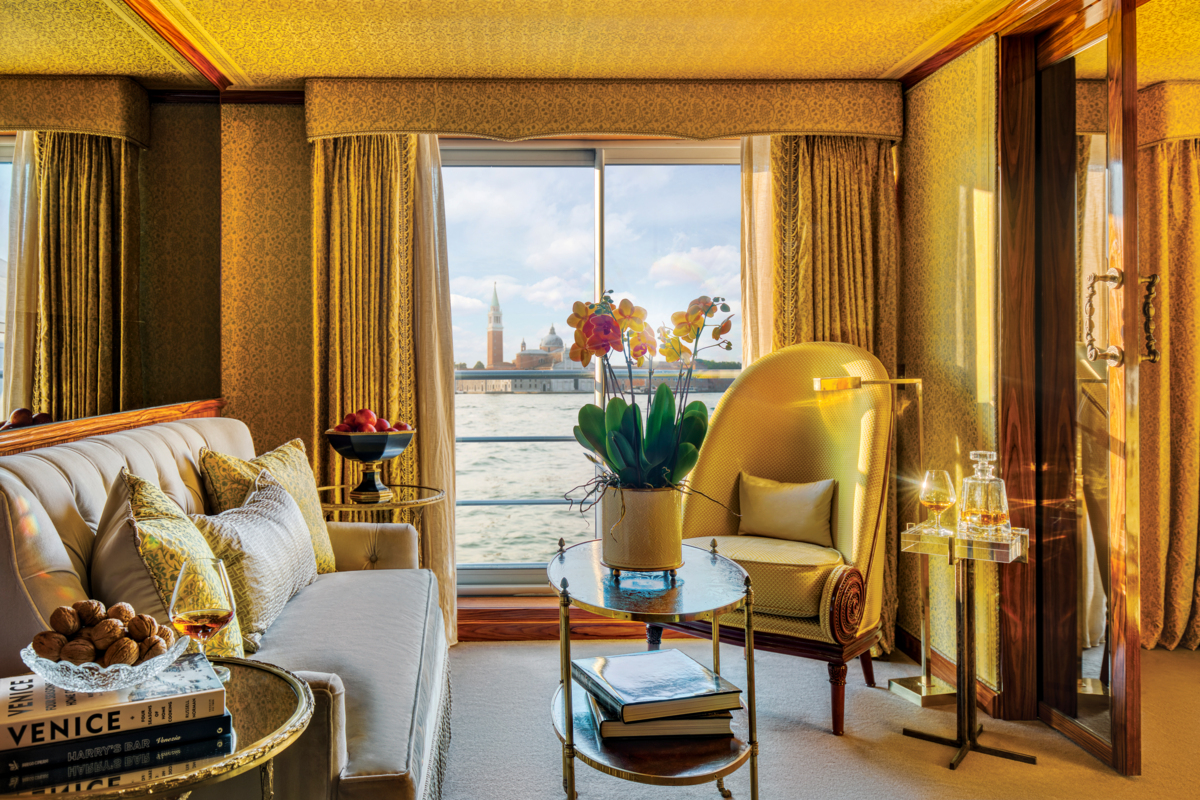
Luxurious riverview grand suite (302 sq ft – 28 sq m) with a French balcony and a spacious living room.
Handcrafted Savoir® Beds of England, closet, hair dryer, safe, individual climate-control thermostat, telephone and flat-screen TV with infotainment center.
Marble bathroom with Asprey bath and body products, plush towels, special towel warmers, cozy bathrobes and slippers, separate bathtub, and backlit magnifying mirror.
Additional amenities and service include: in-suite butler service; packing and unpacking assistance; in-room breakfast; daily fruit and cookie plate, and an elegant evening snack; Nespresso coffee machine and fine teas; fully stocked mini bar; bottle of wine upon arrival; shoe shine and free laundry service.
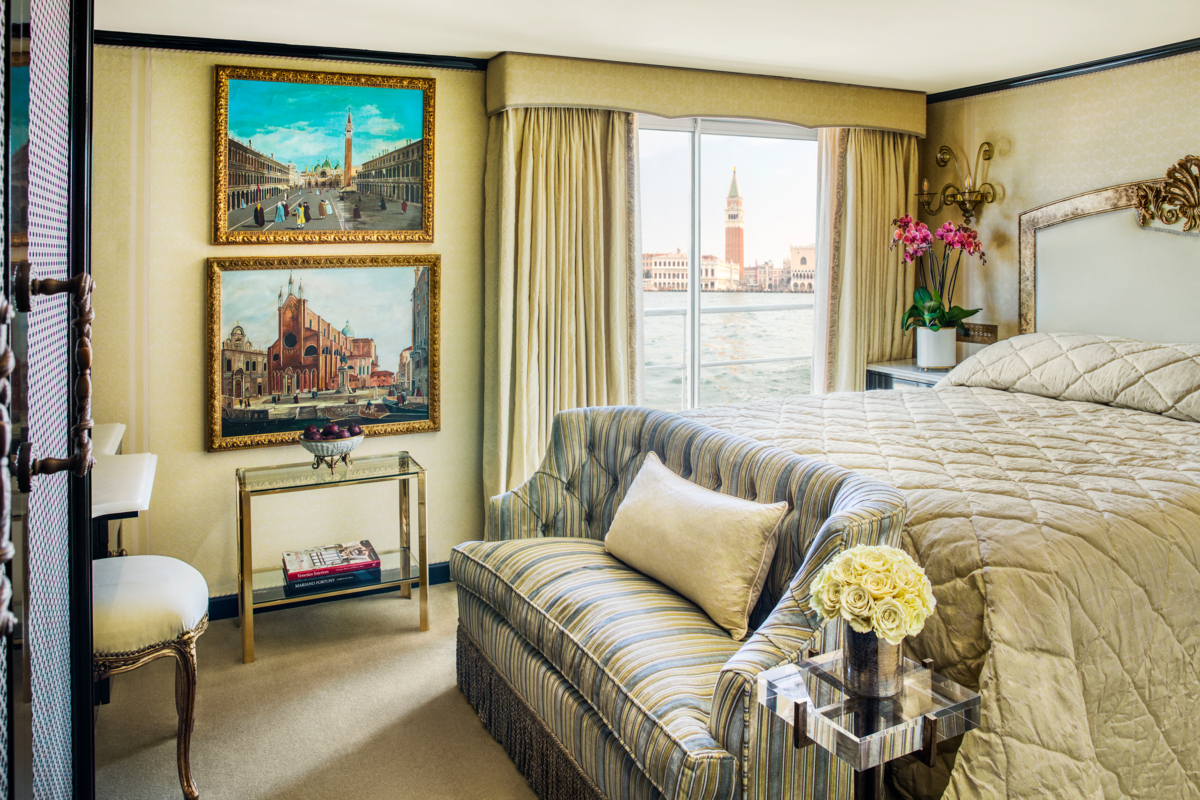
Luxurious riverview suite (214 sq ft – 20 sq m) with a French balcony
Handcrafted Savoir® Beds of England, closet, hair dryer, safe, individual climate-control thermostat, telephone and flat-screen TV with infotainment center
Marble bathroom with Asprey bath and body products, plush towels, cozy bathrobes and slippers, special towel warmers and backlit magnifying mirror
Additional amenities and services, include: in-suite butler service; packing and unpacking assistance; floor heaters; in-room breakfast; daily fruit and cookie plate, and an elegant evening snack; Nespresso coffee machine and fine teas; fully stocked mini bar; bottle of wine upon arrival; shoe shine and free laundry service
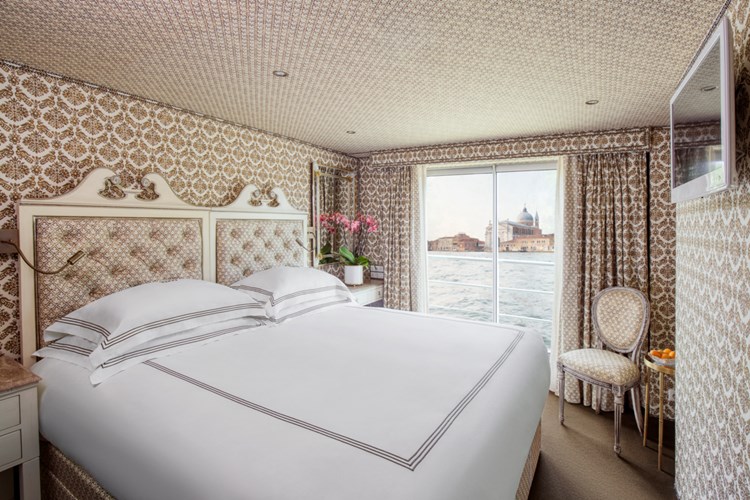
Luxurious riverview stateroom (151 sq ft – 14 sq m) with a French balcony
Handcrafted Savoir® Beds of England, closet, hair dryer, safe, individual climate-control thermostat, telephone and flat-screen TV with infotainment center
Marble bathroom with Asprey bath and body products, plush towels, cozy bathrobes and slippers
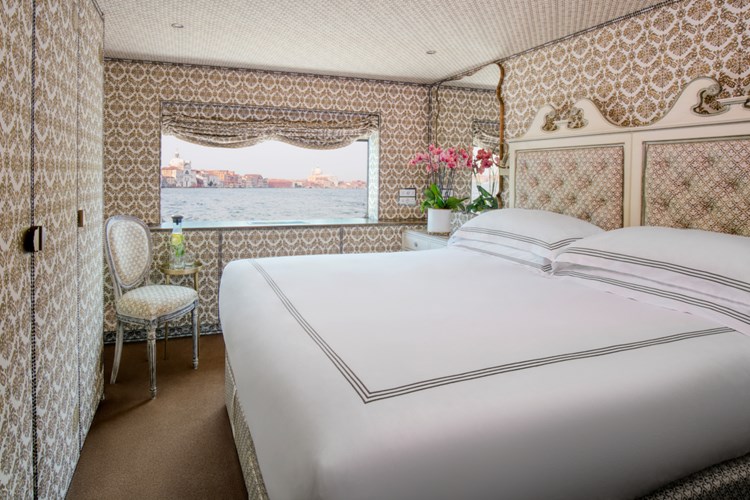
Luxurious riverview stateroom (151 sq ft – 14 sq m)
Handcrafted Savoir® Beds of England, closet, hair dryer, safe, individual climate-control thermostat, telephone and flat-screen TV with infotainment center
Marble bathroom with Asprey bath and body products, plush towels, cozy bathrobes and slippers

Luxurious riverview stateroom (151 sq ft – 14 sq m)
Handcrafted Savoir® Beds of England, closet, hair dryer, safe, individual climate-control thermostat, telephone and flat-screen TV with infotainment center
Marble bathroom with Asprey bath and body products, plush towels, cozy bathrobes and slippers
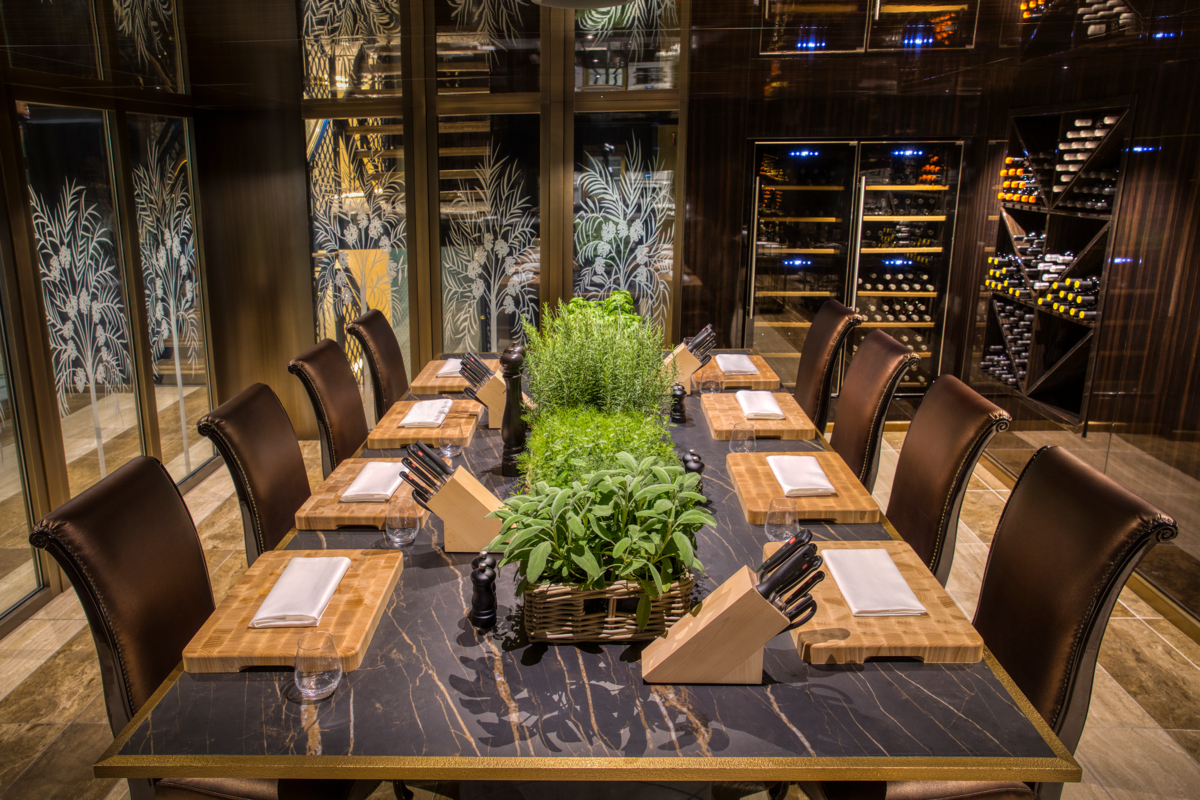
When dining onboard, you’ll be treated to world-class cuisine made from fresh ingredients, locally sourced from the destinations you visit.
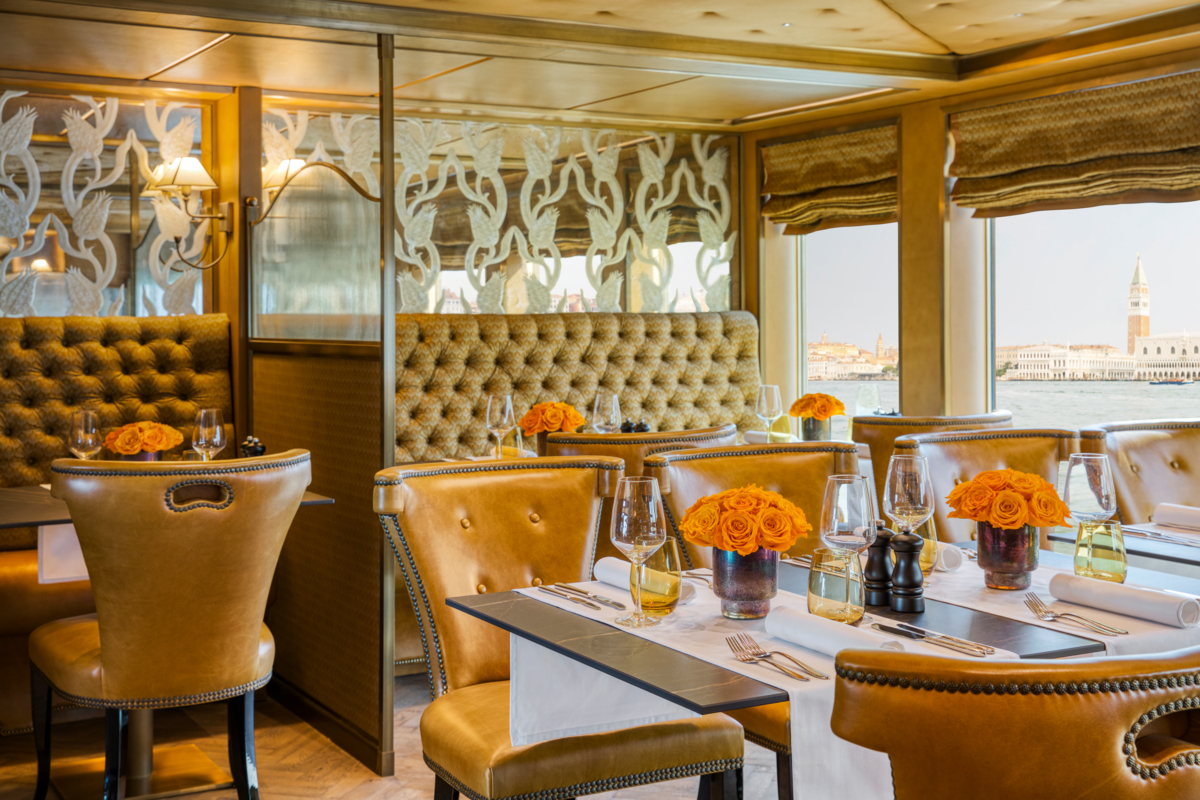
Our classically trained chefs use fresh, locally-sourced ingredients for all onboard meals, which feature both regionally-inspired and western dishes.
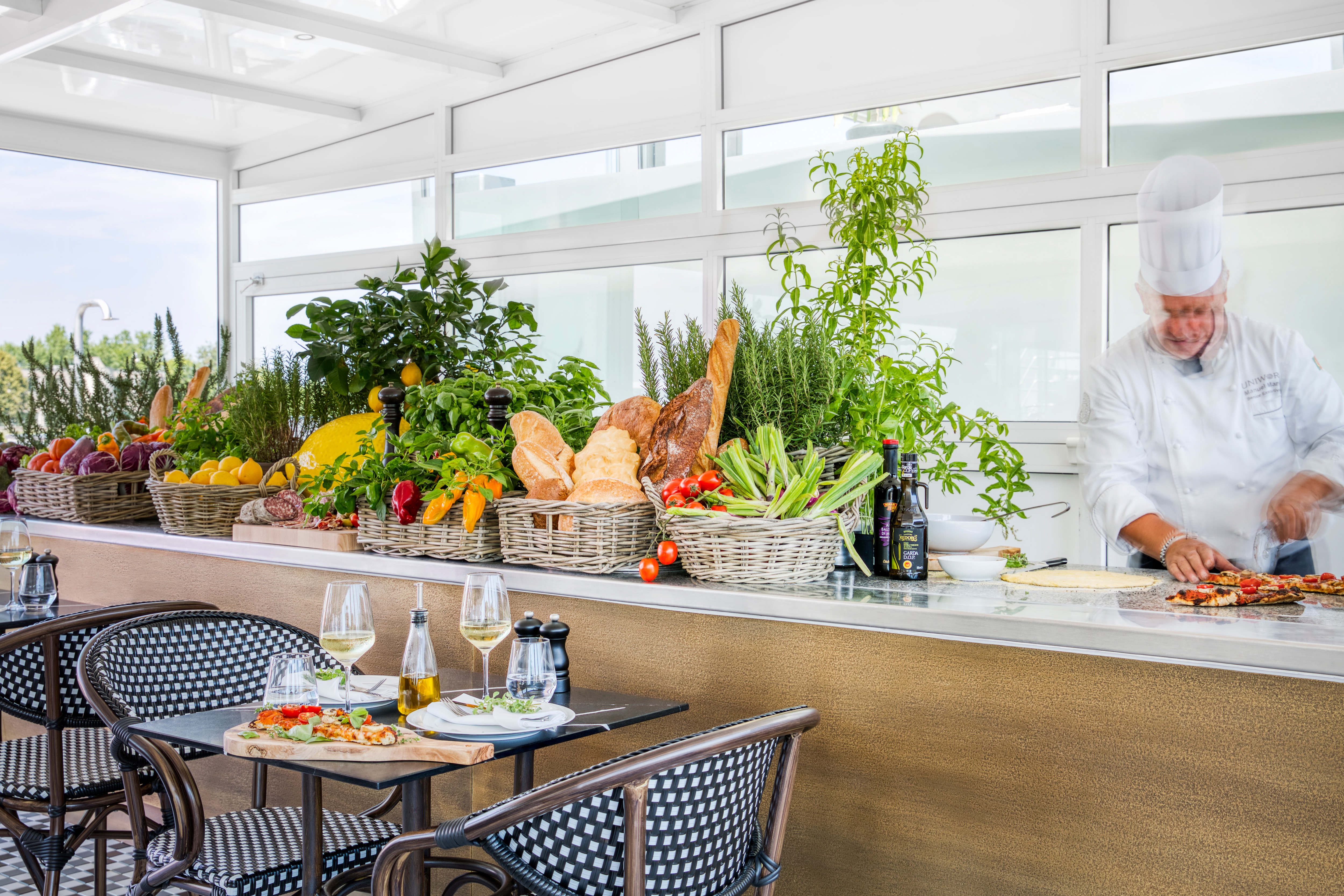
Cielo’s can be found on Lido di Venezia Deck.
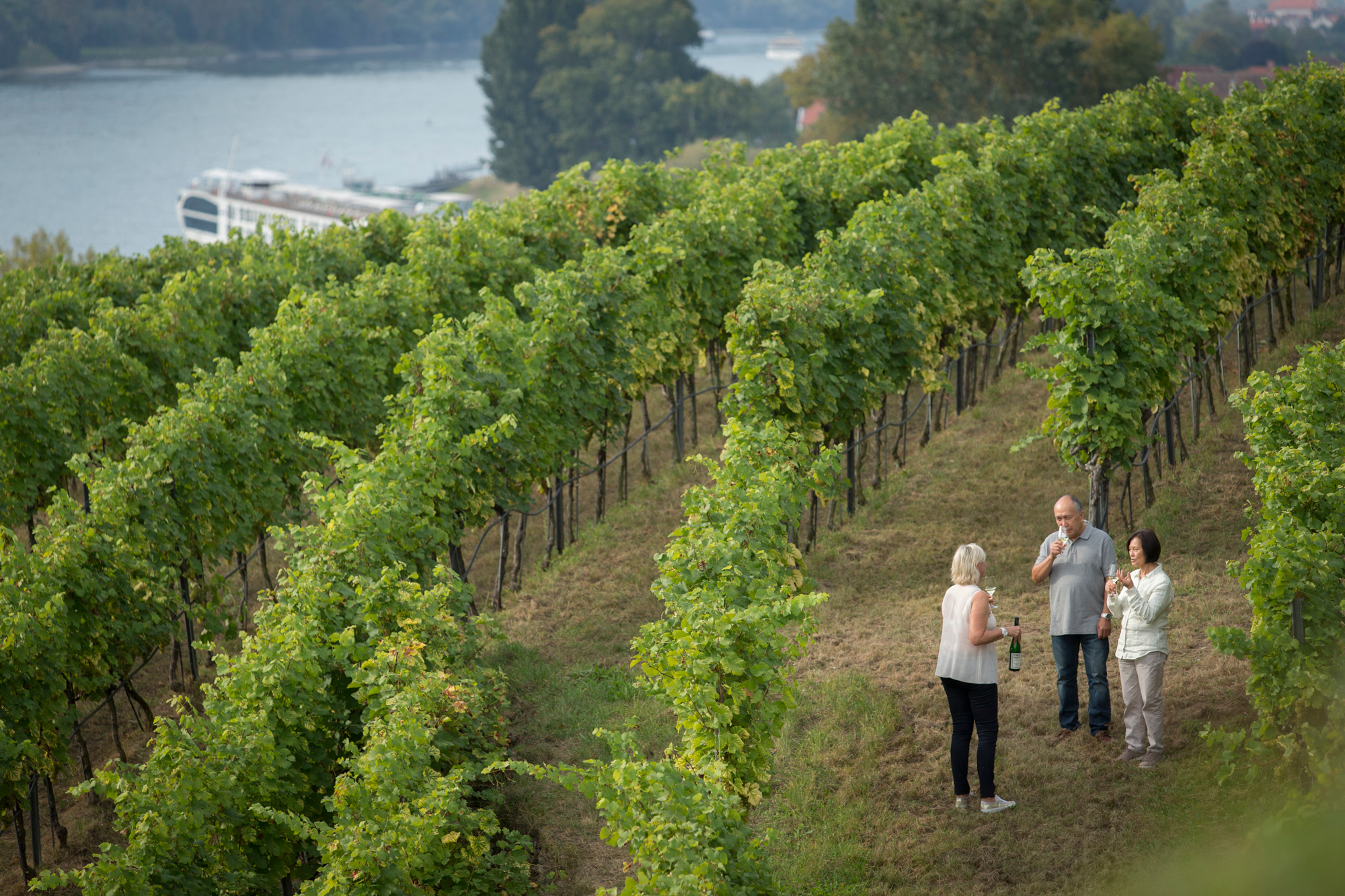
VILLAGE DAY
Get an in-depth look into the quaint destinations we visit and the local people who bring them to life.
LET’S GO
These active excursions feature walking, hiking, cycling, kayaking and golfing activities.
DO AS THE LOCALS DO
Experience life like a local, from riding the subway to stopping into a café for a local treat.
NIGHTS OUT
Private after-hours tours of popular attractions and fun local nightlife experiences.
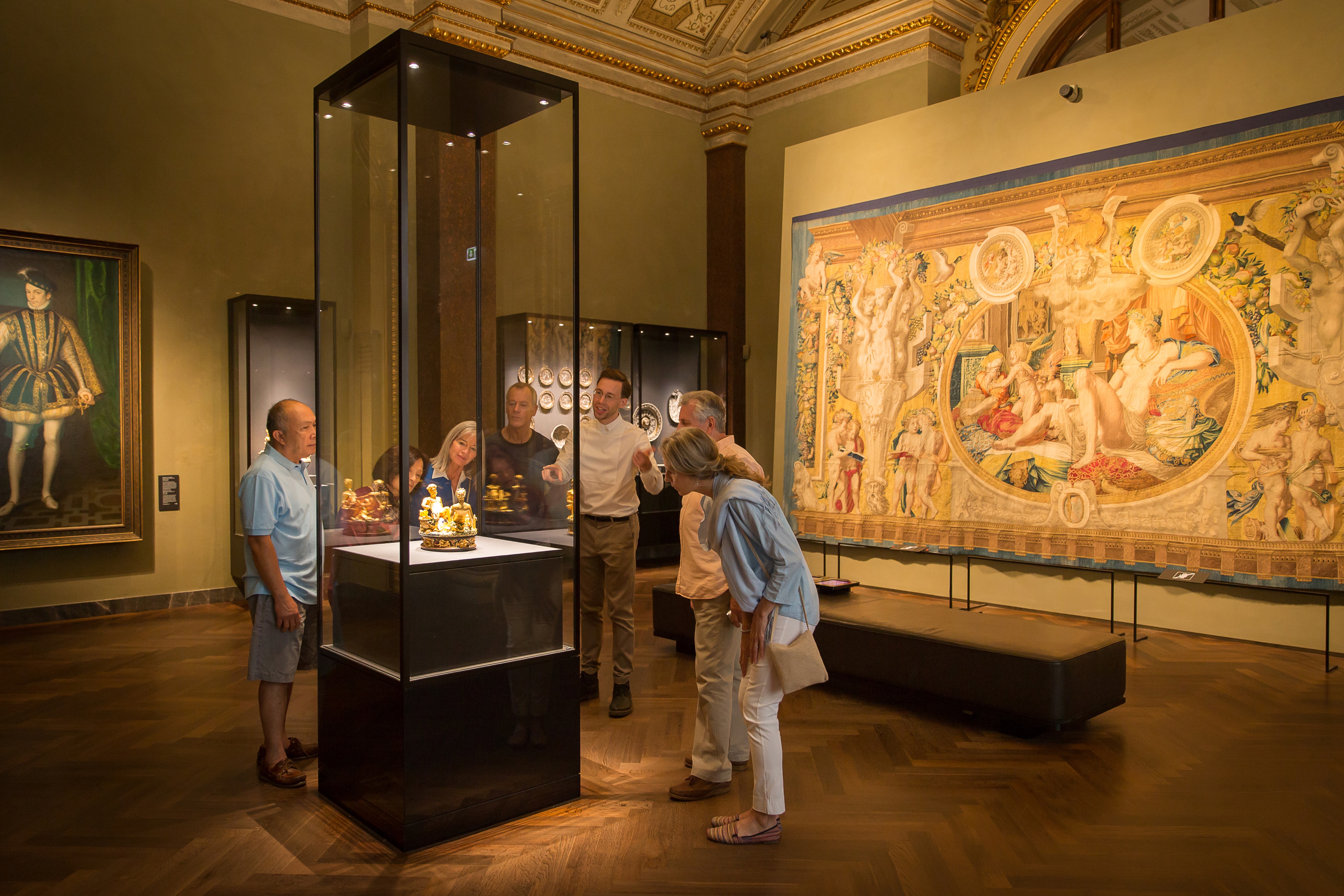
From visiting a museum without the crowds to an after-hours tour of a famous landmark, these included, once-in-a-lifetime experiences are arranged privately for Uniworld guests.

Tasting cheese with a cheese affineur in Rüdesheim or cruising through the streets of Bordeaux in a retro sidecar–if going above and beyond is what you’re after, you’ll be sure to enjoy our selection of Masterpiece Collection optional experiences, available for an additional cost.
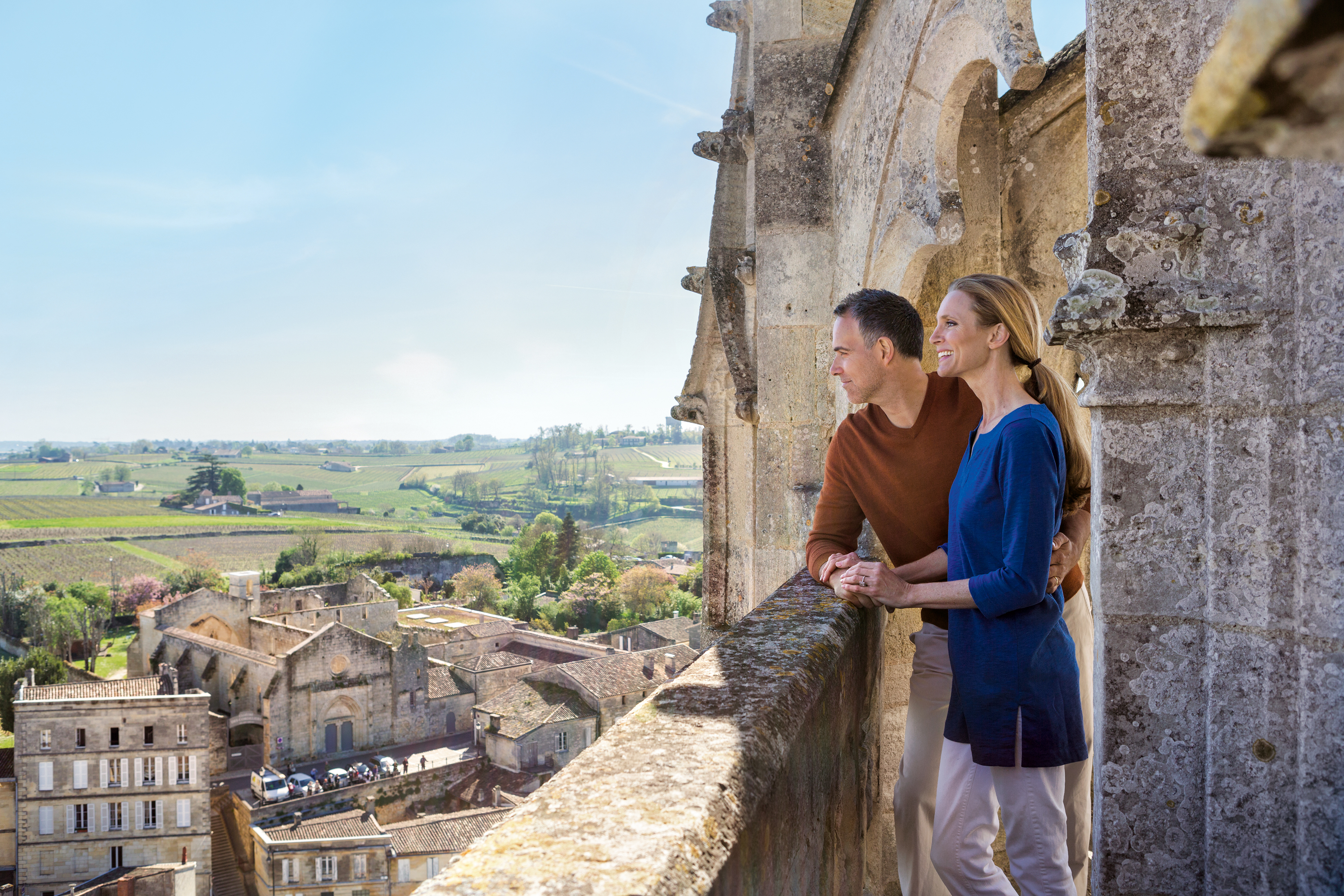
Guests looking to treat themselves and their loved ones to a private, extraordinary experience can arrange a Curated Service. These experiences can be booked onboard, are often accompanied with a private car and/or guide, are fully customizable, and provide guests with an opportunity to create an exceptionally special moment just for them.
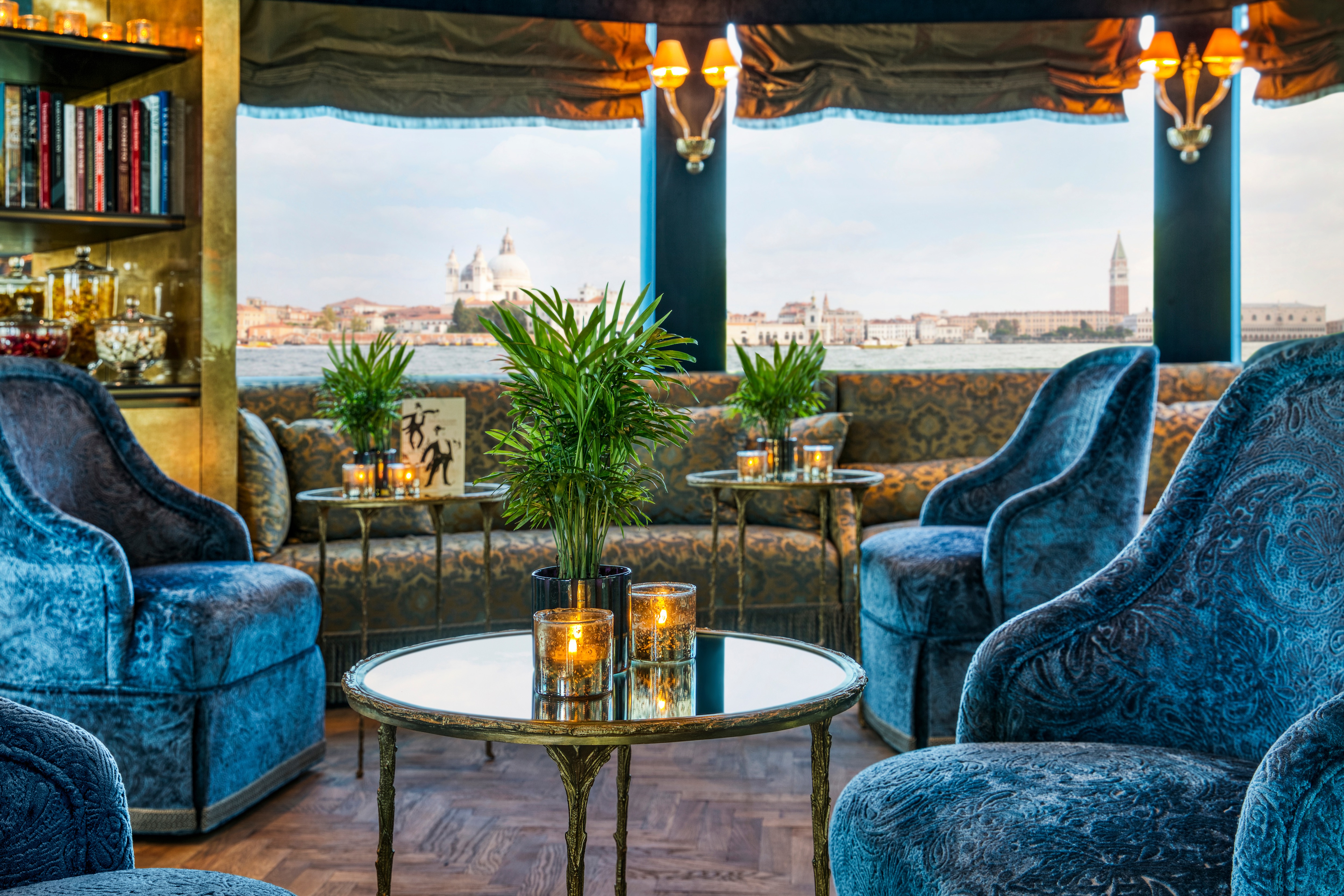
Hari’s Bar and Lounge can be found on the Murano Deck.
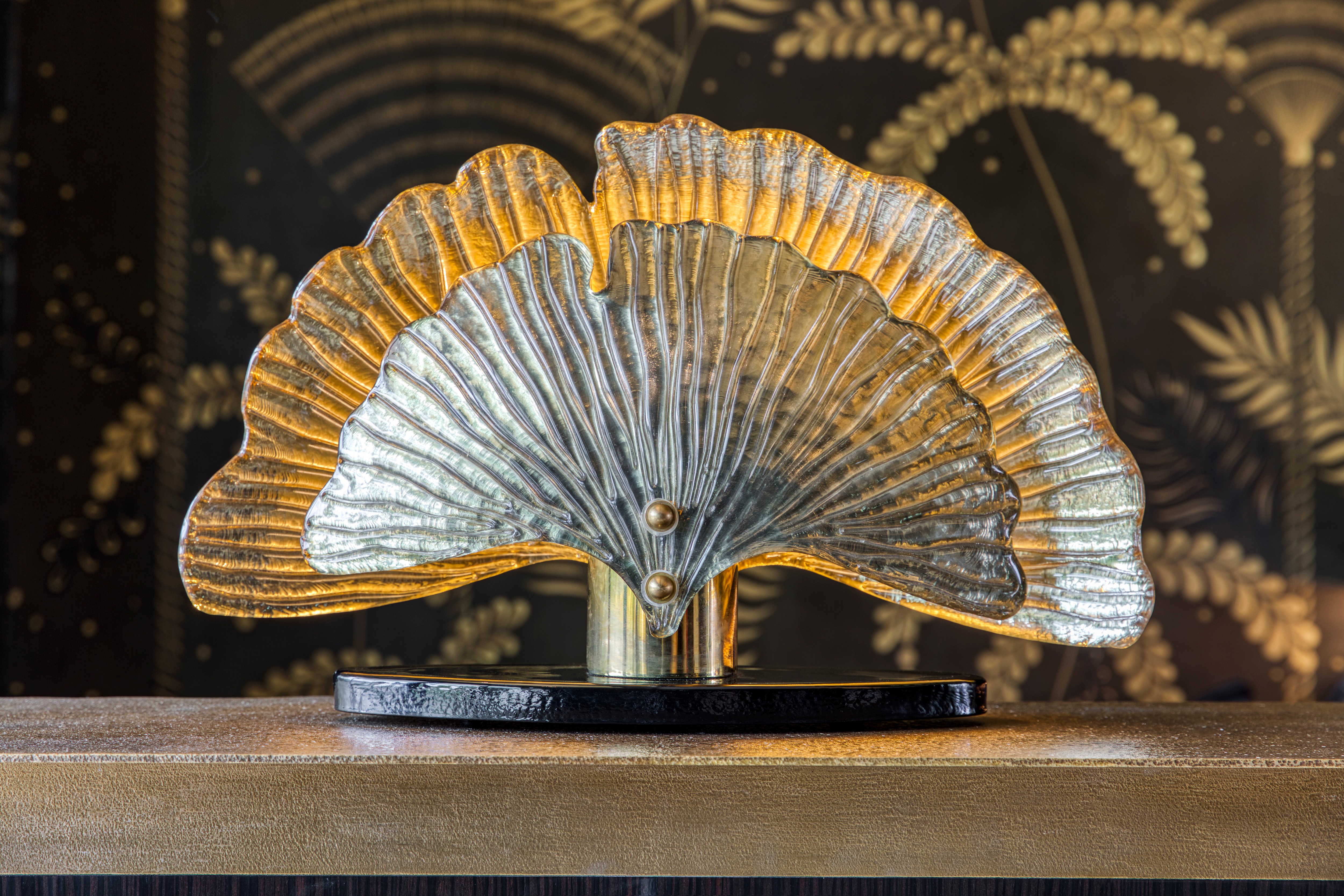
The Lobby can be found on the Burano Deck.
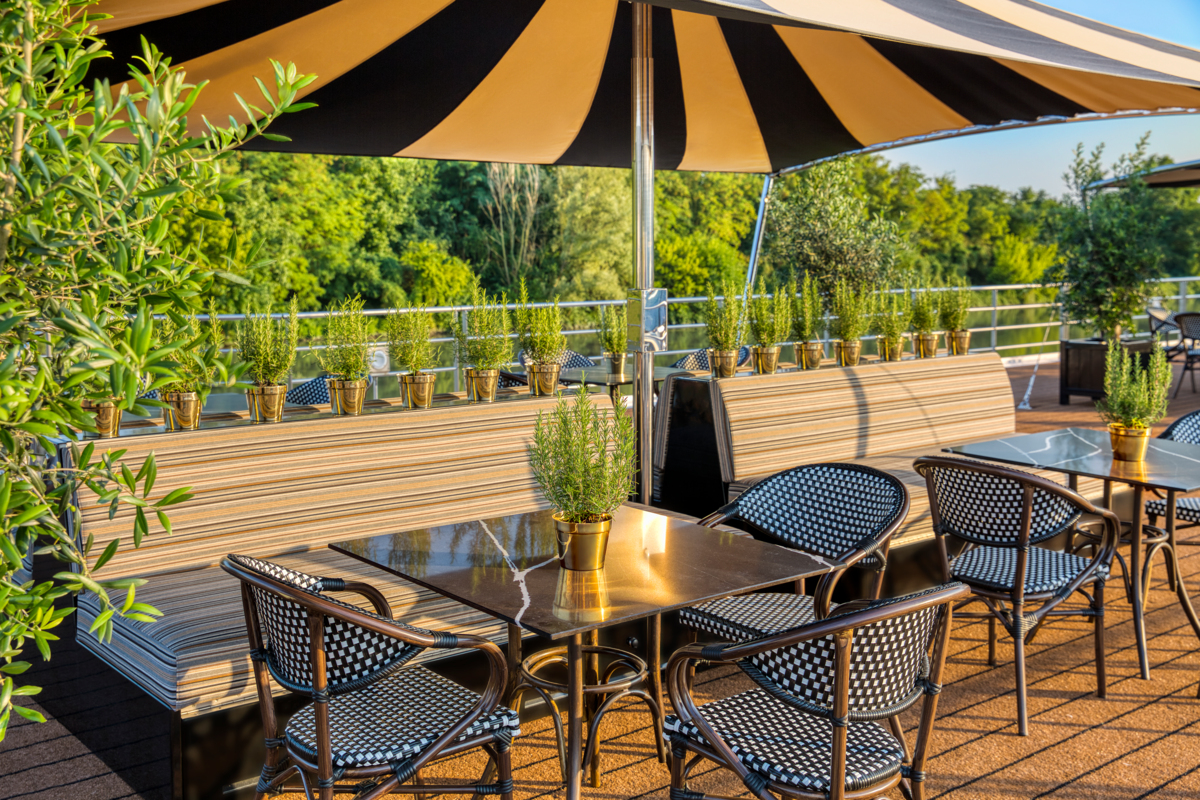
Start your day with sunrise yoga on the top deck, a TRX® Suspension Training class, or work out at your own pace in the well-equipped fitness center. Then, relax at the Serenity River Spa™ with a soothing facial or massage treatment, or take a dip in the heated pool.
For those interested in healthier dining options, our Travelling Lite menu features all the flavor of our traditional menu, but with fewer calories. We also offer a variety of vegetarian and vegan options, prepared just for you. If you have a specific meal preference, just ask. Our chefs will be happy to accommodate.
- Exciting shore excursions tailor-made for families and hosted by local experts
- Kid-friendly menus for each meal and unlimited beverages onboard
- Young Travellers’ Table, a special dining table reserved on certain nights just for our younger guests and Family Hosts
- Onboard activities just for kids, such as cooking classes and dessert-making with the ship’s chef and pastry chef
- Hands-on craft workshops tailored to the destinations you visit
- Young travellers’ lounge and game room, complete with PlayStation, games, movies and local treats
- Two dedicated Family Hosts to oversee all activities for Junior Cruisers (ages 4 to 12 years) and Teen Cruisers (ages 13 to 17 years)
- Opportunities to “Live the Lingo” and learn words and phrases in other languages from our Family Hosts
- Kids-only movie nights, where kids can enjoy popcorn-fueled screenings of family-friendly films along with their new onboard friends and Family Hosts
- A special VIP ship tour with the Captain or Hotel Manager
- Complimentary bicycles, helmets and Nordic walking sticks for use onshore
- Young travellers will receive special surprise pillow gifts for each night of the cruise
- Convenient departures scheduled during summer and winter breaks

Travel has provided us the chance to give back and lift up others, and we strive to do so whenever possible. We focus on making a positive impact and advocating for environmental, social and economic responsibility with the help of our not-for-profit TreadRight Foundation. Founded in 2008 by our parent company, The Travel Corporation, our collective mission is to safeguard people, wildlife and the planet for generations to come and to #MakeTravelMatter.
People
We work with local artisans and small business everywhere we travel, so we can bring you authentic local experiences while also supporting the livelihoods of the people who make these communities special.
Planet
Every year, we find more ways to cut back on our carbon footprint, from committing to eliminate more than 60 types of single-use plastics to becoming carbon neutral by 2030 or sooner and ensuring that at least 50% of our electricity is renewable by 2025.
Wildlife
Partnering with leading wildlife organizations, we work to protect and rehabilitate elephant, rhino and big cat populations around the world, while also educating our guests on ethical wildlife experiences.
We’re Committed to Carbon Neutrality by 2030 or Sooner.
Our five-point plan starts with Measuring our emissions in order to Reduce and Offset our carbon footprint, supports third-party efforts to Remove the existing carbon in the atmosphere and forms critical partnerships so that we continue to Evolve. We’re also ensuring that at least 50% of our electricity is renewable by 2025.
You can get involved too! With our leading carbon offset provider, South Pole, you can purchase carbon offsets to cancel out the emissions produced by your travel. They have 700+ high quality and verifiable offset projects to choose from around the world.
Make Travel Matter® experiences
On our cruises and trips across our TTC family of brands, we offer a selection of included MAKE TRAVEL MATTER® Experiences. They are chosen for the positive environmental or social impact they have on the guests who experience them, and the people and places they visit, and they support one or more of the United Nation’s Global Goals.
Make Travel Matter® pledge
We’ve partnered with TreadRight and The Travel Corporation to launch the MAKE TRAVEL MATTER® Pledge. Uniworld employees, alongside our 10,000 colleagues across 42 travel brands worldwide, have been asked to take this pledge to make travel matter and help protect people, the planet and wildlife. As travellers, travel providers and members of the global travel industry, this pledge serves as the next step in our long-standing commitment to sustainable tourism and conscious travel.
Say Goodbye to Single-Use Plastics
It is estimated that an additional eight million tons of plastic pour into our oceans every year. According to a report by the World Economic Forum, if nothing is done to push back against the deluge of plastics currently overwhelming our oceans there could be more plastic in the oceans than fish by 2050.
Under the guidance of The Travel Corporation and TreadRight, we will ban more than 60 types of single-use plastics across all operations—including straws, water bottles and plastic bags—by 2022. It’s all part of our commitment to ensure the environment remains vibrant for generations to come.
In our experience, most young children—especially those under 4—are simply not yet old enough to enjoy river cruising. We make no special arrangements for little ones and offer few kid-friendly activities onboard or onshore. Please note: Our Generations program departures include programs and services designed for families traveling with children. Adults accompanying children are responsible for their safety and behavior onboard and onshore.
Europe, Asia, India, and Egypt: Guests should be 4 years of age or older. Guests who are less than 18 years of age must be accompanied by a parent or guardian and booked in a cabin with someone who is 21 years of age or older.
Peru: Guests must be 7 years of age or older. Guests under 21 must be booked in a cabin with someone who is 25 years of age or older, or traveling with a parent or guardian who is booked in a connecting suite. Some excursions may not be suitable for young children.
Select ships offer complimentary Wi-Fi access. Please view your ship’s specific information page on our website or email us at info@uniworld.com to find out if Wi-Fi is available onboard. Service may be briefly interrupted in remote areas, while sailing, or when moving through locks, and the speed will likely be slower than what you are used to back home.
Kindly inform us in advance if you have specific dietary requests (e.g., low-fat, low-calorie, gluten-free, sugar-free, vegetarian, etc.). This information can be provided to us when completing your Passenger Information Form. We have a “Travelling Lite” menu for guests seeking more health-conscious options, as well as light lunches, vegetarian options, and generous buffets that offer something for everyone. We will do our very best to accommodate your needs given the resources available to us.
Most ships have either a self-serve laundrette (with ironing board) or laundry service for an additional fee. Please contact info@uniworld.com to find out what services your ship offers. No dry cleaning services are available on any ship.
It’s best to pack for a range of weather conditions, depending on the season and regions visited. Wearing layers will allow you to easily adjust to temperature changes. Limiting your wardrobe to a simple mix-and-match color scheme will keep your bags to a minimum.
We recommend wearing comfortable, smart-casual clothing both onshore and onboard. We also suggest sturdy walking shoes, as you will do a significant amount of walking on shore excursions, often over cobblestones or uneven terrain. A sun hat, rain gear, and a coat or wrap for chilly evenings are useful items to have. For dining ashore, concerts, special events onboard, etc., men may want to bring a sports jacket and women a cocktail dress or pantsuit. Neckties are optional. Please note that shorts are not allowed at dinner aboard the ship.
For the comfort of all our guests, smoking is only permitted on the sun decks of our ships. Smoking is not permitted on motorcoaches. This policy applies to all forms of smoking materials including vapor e-cigarettes.
We also ask guests to refrain from smoking on shore excursions/tours, especially since many historical sites and other tourist attractions are now smoke-free as well.
There’s all-inclusive, and then there’s the unmatched level of inclusive luxurious amenities that only we provide. To ensure truly carefree and effortless travel, we’ve gone ahead and included it all–so the only thing you have to do is sit back, relax and enjoy your vacation.
- UNLIMITED premium spirits and wines
- Delicious, FIVE-STAR, farm-to-table cuisine
- Your choice of CAREFULLY CURATED EXCURSIONS
- ALL GRATUITIES onboard
- Onboard FITNESS CENTER and WELLNESS CLASSES with a certified wellness instructor
- All scheduled AIRPORT TRANSFERS
- BICYCLES and NORDIC WALKING STICKS for onshore use
- Shipwide INTERNET and WI-FI access
- Onboard ENTERTAINMENT and ENRICHMENT

- Cielo’s
- Bridge

- Ristorante Rialto
- Reception
- Captain’s Lounge
- Library
- Cruise Manager Desk
- Bar
- Hari’s Bar
- Grand Suite
- Suite
- French Balcony Staterooms

- La Cantinetta
- Fitness Centre
- 24hr Coffee & Tea Station
- Serenity River Spa
- Deluxe Staterooms

- Guest Laundry
- Classic Staterooms

